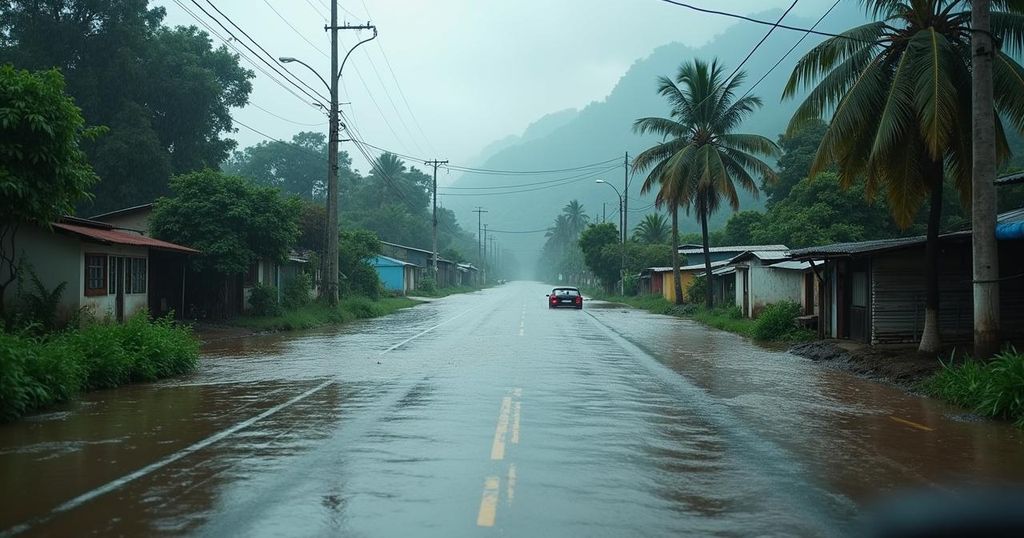Torrential rains in West and Central Africa have resulted in severe flooding, affecting over 400,000 individuals in northeastern Nigeria alone and leading to more than 1,000 deaths across multiple countries. The disaster has compounded existing humanitarian crises, particularly in Chad, Mali, and Niger. Local authorities are struggling to respond effectively, and there is a growing call for international assistance as the region faces ongoing weather threats.
Severe flooding continues to inflict devastation across West and Central Africa, with reports indicating that more than 400,000 individuals have been adversely affected in northeastern Nigeria alone. According to a recent United Nations report, the catastrophic floods, triggered by incessant torrential rains, have displaced countless families and rendered entire neighborhoods uninhabitable. In Maiduguri, the capital of Borno state—a region already beleaguered by an ongoing insurgency—residents are witnessing an unprecedented humanitarian disaster. With more than 1,000 fatalities documented across the region this year, the floods exacerbate an already dire situation, impacting countries including Chad, Niger, Mali, and Nigeria, affecting over four million lives—a troubling increase from previous years. As local authorities grapple with the scale of the disaster, the immediate aftermath of a dam collapse near Maiduguri has further intensified the crisis. Eyewitness accounts reveal harrowing scenes where individuals, including inmates from a flooded prison, were forced to flee submerged facilities. The ongoing rescue operations face significant challenges amidst rising waters and the tragic loss of life. Reports suggest that the casualties include at least 230 in Nigeria, with additional deaths reported in Chad (487), Niger (265), and Mali (55)—the region’s floods considered among the most severe since the 1960s. Authorities are overwhelmed, with Borno state reporting over 600,000 individuals displaced and numerous fatalities. Meanwhile, the damages extend beyond human loss; critical infrastructure such as dikes and bridges has failed, severely disrupting transportation and communication. The local government has urgently called for international assistance as they stretch their limited resources to address this unprecedented emergency. The floods have also claimed a heavy toll on wildlife, with approximately 80% of animals at the Borno State Museum Park lost, and numerous reptiles escaping into the surrounding areas. Despite some areas beginning to recover, the continuous threat of further rainfall raises concerns about the potential for renewed flooding. Survivors such as Saleh Bukar recount their terrifying experiences of being awakened by desperate cries warning of the rising waters. Tragically, some individuals, particularly those unable to evacuate quickly, have become victims of the flood. Humanitarian agencies, including the World Food Program and USAID, have mobilized to provide assistance, but many affected individuals feel abandoned by authorities, struggling to rebuild their lives in the absence of adequate support.
West and Central Africa frequently confronts the ramifications of extreme weather patterns, with the recent floods being tied to torrential rains across the region. This year’s floods have triggered significant humanitarian crises, particularly in the fragile economic and security context of countries like Nigeria, Chad, Mali, and Niger. The continuous threat of violent extremism, particularly in Northeast Nigeria, amplifies the complexities surrounding disaster response efforts. Furthermore, the region’s vulnerability to climate change, despite contributing minimally to global greenhouse gas emissions, emphasizes the urgent need for adaptation strategies.
In conclusion, the torrential rains and floods currently affecting West and Central Africa underscore a profound humanitarian crisis that demands urgent attention and support. With a devastating toll in human lives, considerable displacement of populations, and destruction of critical infrastructure, the affected regions face ongoing challenges. Immediate international assistance and long-term strategies for climate adaptation remain essential to protect vulnerable communities in the wake of such catastrophic events.
Original Source: apnews.com







